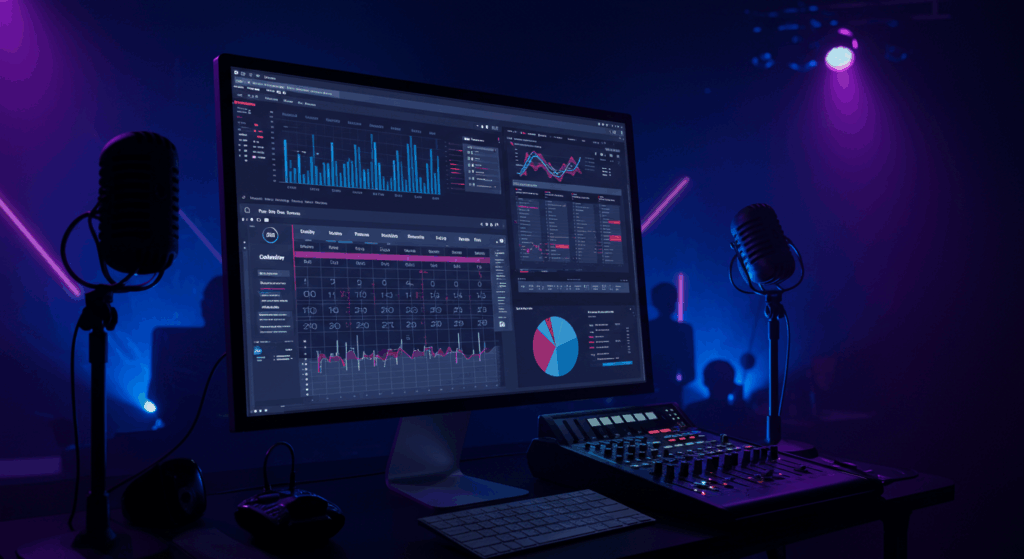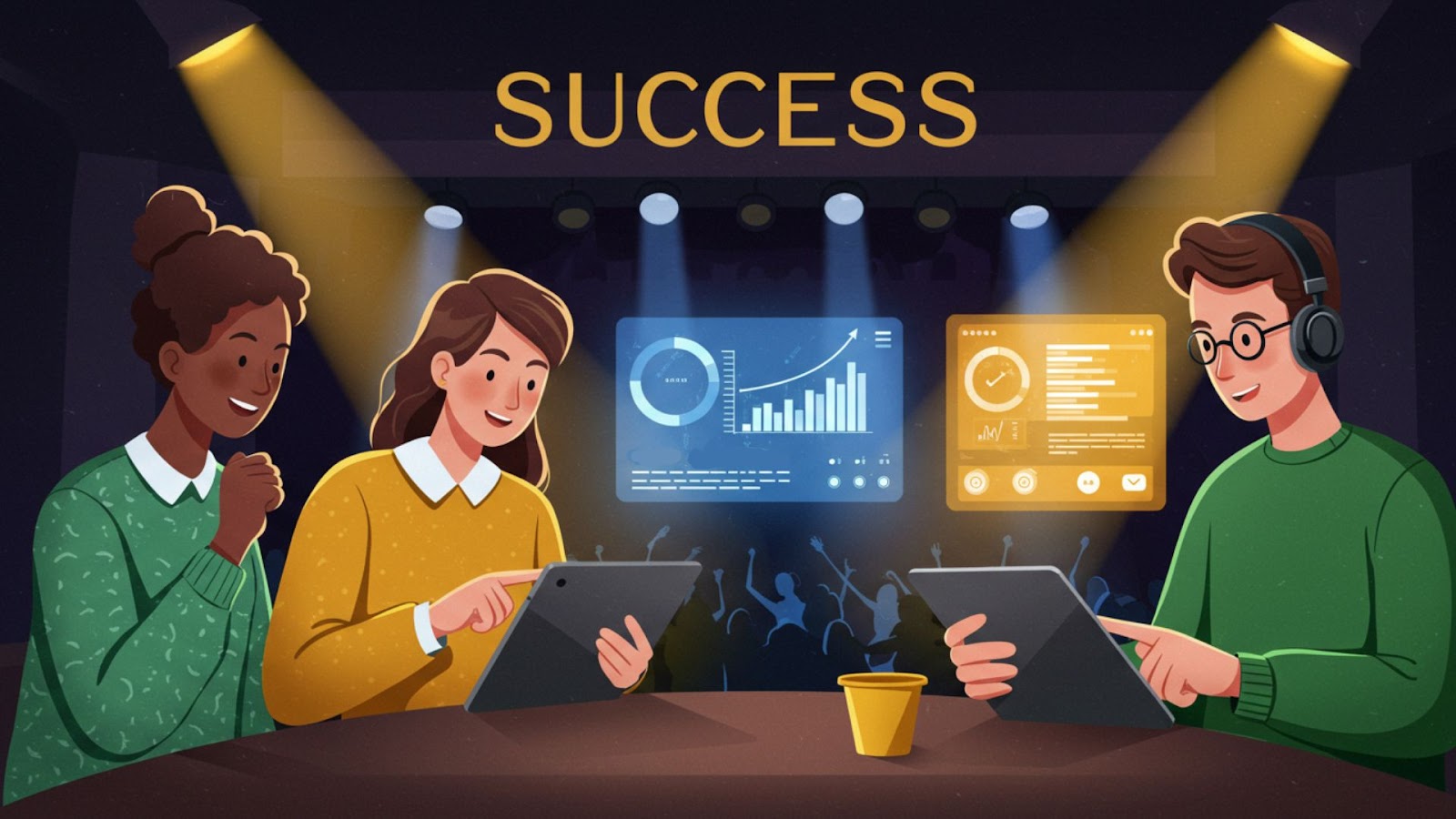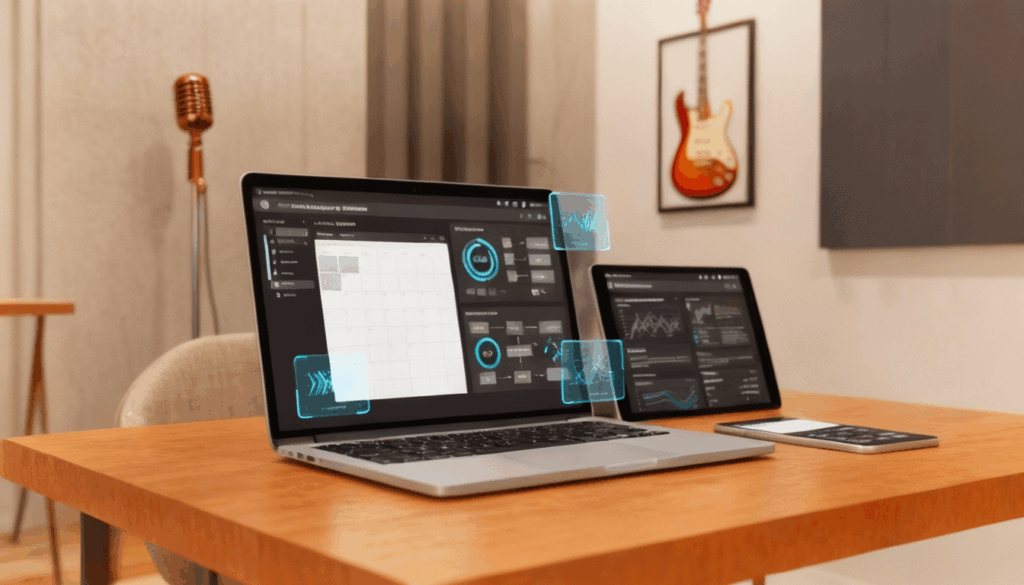
The Complete Guide to Talent Buying Software
Modern talent buying software transforms chaotic manual processes into streamlined workflows that save hundreds of hours annually.
- Key benefits include automated deal tracking, integrated financial management, real-time collaboration tools, and mobile accessibility
- Businesses implementing automation solutions report ROI improvements within the first year through increased efficiency and reduced errors
- Essential features to evaluate include calendar management, settlement automation, communication tools, and third-party integrations
The right system eliminates spreadsheet hell and gives you back time to focus on booking killer shows and building relationships.
The live music industry is exploding. Global live music revenues hit $33 billion with a 25% growth rate, and Goldman Sachs projects the market will surpass $50 billion by 2030. But here’s the brutal truth: most venues and promoters are still managing this growth with the same broken systems they used a decade ago. Spreadsheets. Email chains. Handwritten notes. Disconnected apps that don’t talk to each other.
Sound familiar? That’s where talent buying software comes in. Not just another app promising to solve your problems, but a complete system designed specifically for the chaos of live music booking. Modern platforms are built by people who actually understand the difference between a guarantee and a door deal.
What Is Talent Buying Software, and Why Do You Need It?
Talent buying software is designed to manage every aspect of live event booking, from initial holds to final settlement. Unlike general event management tools, these systems understand the unique complexities of music industry deals: percentage splits, co-promotions, agent commissions, rider requirements, and the thousand other details that can make or break a show.
The problem with manual processes is risk. When you’re managing 100+ shows per year, even small mistakes compound into major problems. Double-booked venues. Missed payment deadlines. Settlement errors that cost thousands. Artist riders buried in email chains.
Automation can reduce operational costs by up to 30%, and businesses implementing automation solutions report ROI improvements ranging from 30% to 200% within the first year. For venues and promoters, these numbers are the difference between thriving and barely surviving.
Here’s what proper talent booking software eliminates:
The Spreadsheet Spiral: That Excel file with 47 tabs, color-coded cells that lost their meaning months ago, and formulas so complex they require a computer science degree to modify.
Communication Chaos: When deal terms are scattered across emails, texts, phone calls, and that napkin from the bar meeting, something will get lost. Usually something expensive.
Settlement Nightmares: Calculating splits, deductions, and payments manually is where fortunes disappear and relationships implode. One decimal point error can cost you thousands.
Calendar Catastrophes: Managing holds, confirms, and availability across multiple venues without a centralized system is like playing Russian roulette with your reputation.
The reality is that most venue managers spend between one and four hours every day on booking and ticketing alone. That time could be spent building relationships, discovering new talent, and actually growing your business.
Essential Features Every Talent Buying Platform Must Have
The music industry has specific needs that generic business tools can’t handle. Here are the non-negotiable features your platform must include:
Deal Tracking and Workflow Management
Your system needs to track every deal from initial inquiry to final settlement. This means managing holds (with automatic expiration alerts), tracking offer negotiations, and maintaining a complete audit trail of every change. You should be able to see exactly where each deal stands at any moment, who’s responsible for the next action, and what deadlines are approaching.
Effective event deal tracking eliminates the chaos of managing multiple negotiations simultaneously. The best platforms automate routine tasks like sending expiration warnings, generating renewal notices, and flagging deals that need attention.
Calendar and Availability Management
Multi-venue operators need real-time visibility across all locations. Your calendar should show availability, confirmed shows, holds, and potential conflicts in one unified view. Integration with external calendars (Google Calendar, Outlook) ensures everyone stays synchronized.
Advanced features include automated conflict detection, hold prioritization rules, and the ability to quickly assess routing opportunities when new tours are announced.
Financial Tools and Settlement Automation
Finances are where talent booking software separates itself from generic event platforms. Your system must handle complex deal structures: guarantees versus percentages, tiered payment scales, agent commissions, co-promotion splits, and all the math that defines music industry contracts.
Settlement automation eliminates manual calculations and reduces errors. The platform should generate professional settlement sheets, track payments, and provide real-time financial reporting. When co-promotions are involved, the system needs to handle split calculations automatically.
Communication and Collaboration Features
Modern talent buying involves agents, managers, promoters, venue staff, production teams, and marketing departments. Your platform should centralize communications, maintain conversation history by show, and ensure nothing falls through the cracks.
Look for features like automated notification systems, document sharing, task assignment, and mobile accessibility. Your team should be able to manage deals from anywhere, not just the office.
Integration Capabilities
Your talent booking software needs to connect seamlessly with ticketing platforms, accounting systems, marketing tools, and payment processors. Poor integration means double data entry, increased errors, and missed opportunities.
The most valuable integrations include:
- Ticketing platforms for real-time sales data
- Accounting software for seamless financial management
- Email marketing tools for fan engagement
- Payment processors for automated transactions

How Talent Buying Software Transforms Your Workflow
The real power of talent booking software becomes apparent when you see how it revolutionizes your daily operations. Here’s how the right platform transforms each stage of the booking process:
1. From Inquiry to Booking Confirmation
Old Way: Agent calls about availability. You scramble through multiple calendars, email your team to check conflicts, manually create a hold, and pray you remember to follow up before it expires.
New Way: Agent request triggers an automatic availability check across all venues. The system identifies potential conflicts, suggests alternative dates, and creates a timestamped hold with automated expiration alerts. Your team receives instant notifications, and follow-up reminders ensure nothing slips through the cracks.
2. Deal Negotiation and Contract Management
Old Way: Negotiation terms live in email threads. Contract details get lost in forwarded messages. Someone has to manually track which terms were agreed to and which are still being discussed.
New Way: All negotiation history is centralized by show. Contract templates automatically populate with agreed terms. Changes trigger notifications to relevant stakeholders. The platform maintains a complete audit trail of every modification.
3. Show Preparation and Logistics
Old Way: Production requirements are buried in email attachments. Team members work from different versions of run sheets. Important details get overlooked until show day disasters unfold.
New Way: All show information is centralized and accessible. Team members collaborate in real time. Automated checklists ensure nothing gets missed. Mobile access means critical information is available wherever you are.
4. Post-Show Settlement and Reporting
Old Way: Gathering box office reports, calculating splits, and generating settlements consumes days. Manual calculations introduce errors. Payment tracking happens through separate systems.
New Way: Ticketing integration provides real-time data. Settlement calculations happen automatically. Professional reports generate instantly. Payment tracking and reminders are built in.

What to Look for in Talent Buying Platforms
Talent buying software platforms offer various approaches to live music management. When evaluating options, focus on these key differentiators rather than getting caught up in feature checklists:
Industry-Specific vs. Generic Solutions
The biggest divide in the market is between platforms built specifically for live music and generic event management tools. Music industry platforms understand complex deal structures.
Generic platforms might help with basic scheduling, but they’ll fail when you need to calculate a tiered guarantee with an 85/15 split after expenses. The best live event booking tool will speak your language and understand your workflow, not force you to adapt to generic business processes.
Scalability and Complexity Balance
Platforms range from simple booking tools for small venues to enterprise systems designed for major agencies managing hundreds of artists. The key is finding the right balance for your current needs while allowing room for growth.
Overly complex systems overwhelm smaller operations with features they don’t need, while simple tools become limitations as businesses grow. Look for platforms that can scale with your operation rather than forcing you to switch systems later.
Integration and Ecosystem Approach
The most valuable platforms speak with your existing tools: ticketing systems, accounting software, payment processors, and marketing platforms. Standalone solutions create data silos and force manual work that automation should eliminate.
Consider the total ecosystem, not just the core features. A platform with strong integrations often provides more value than one with extensive built-in features that don’t connect to your other tools.
Evaluating Talent Buying Software: Your Complete Checklist
Use this comprehensive checklist to evaluate potential platforms:
Core Functionality
Automated hold management with expiration alerts
Multi-venue calendar integration
Event deal tracking with negotiation history and audit trails
Professional offer and contract generation
Complex settlement calculations (percentages, guarantees, splits)
Co-promotion and partnership deal handling
Real-time financial reporting and analytics
Mobile accessibility for field operations
Integration Requirements
Ticketing platform connectivity (real-time sales data)
Accounting software integration (QuickBooks, etc.)
Email marketing tool connections
Payment processor integrations
Calendar synchronization (Google, Outlook)
Document management and sharing
API availability for custom integrations
User Experience and Training
Intuitive interface requiring minimal training
Comprehensive documentation and tutorials
Responsive customer support
Regular platform updates and improvements
User community and knowledge sharing
Onboarding assistance and data migration support
Security and Compliance
Data encryption and secure storage
User permission management and access controls
Regular security audits and compliance certifications
Reliable backup and disaster recovery procedures
GDPR and other privacy regulation compliance
Scalability and Growth
Ability to handle increasing deal volume
Multi-venue and multi-user support
Customizable workflows and business rules
Advanced reporting and analytics capabilities
Integration with additional tools as needs grow
Making the Switch: Implementation Best Practices
Transitioning to new talent buying software requires careful planning and execution. Here’s your roadmap to success:

Migration Planning
Start by auditing your current processes and data. What information needs to transfer? Which workflows can be improved during the transition? Create a comprehensive data backup before beginning any switch.
Most platforms offer data import tools, but expect some manual cleanup. Use this opportunity to eliminate outdated information and standardize your data formats.
Team Training Strategies
Research shows that 70% of marketing leaders plan to increase automation investment, but success depends on proper user adoption. Start training with your power users, the people who will become internal champions for the new system.
Create role-specific training programs. Your talent buyers need different knowledge than your accounting team. Focus on daily workflows first, then advanced features as users become comfortable.
Success Metrics to Track
Establish baseline metrics before implementation:
- Time spent on administrative tasks per show
- Frequency of settlement errors
- Average time from inquiry to confirmed booking
- Number of missed deadlines or expiration dates
- Overall deal profitability and margin analysis
Track these metrics monthly during the first year. Many venues see significant improvements within a few months.
Common Implementation Pitfalls
Rushing the rollout: Take time to properly configure the system for your specific needs. Generic setups miss opportunities for optimization.
Skipping training: Even intuitive software requires adjustment time. Invest in comprehensive training to maximize adoption.
Ignoring integration opportunities: The biggest efficiency gains come from connecting your talent buying software to other systems. Plan integrations from day one.
Underestimating change management: People resist new systems. Communicate benefits clearly and provide ongoing support during the transition. Understanding why venues need automated systems helps build buy-in from skeptical team members.
Your Next Steps: Choosing the Right Platform
Talent buying software continues evolving, with new features appearing regularly. The key is finding a solution that matches your current needs while providing room for growth.
Consider your deal volume, venue count, team size, and budget constraints. More importantly, think about where your business will be in three years. The live event booking tool you choose today should support that future growth.
Don’t get caught up in feature lists. Focus on systems that solve your biggest pain points first. The rest can be addressed as you grow into the platform’s capabilities.
Choose a vendor that understands the live music industry. Generic business software companies don’t grasp the nuances of talent buying. You need partners who speak your language and understand your challenges.
Frequently Asked Questions
What’s the difference between talent buying software and general event management tools?
Talent buying software is built specifically for live music industry workflows. It understands complex deal structures like percentage splits, co-promotions, and agent commissions that generic event tools can’t handle.
How long does implementation typically take?
Implementation timelines depend on how messy your current setup is. Get your calendar and basic deal tracking running first. Most agencies see immediate benefits within the first few weeks just from having centralized communication and automated hold management.
What integrations should I prioritize?
Start with your ticketing platform for real-time sales data, then accounting software for seamless financial management. Email and calendar integrations provide immediate productivity benefits, while payment processors and marketing tools can be added as you grow into the system.
Ready to Transform Your Talent Buying Process?
The live music industry waits for no one. While you’re wrestling with spreadsheets and chasing down settlement details, your competition is booking the acts you want with systems that actually work.
Prism has helped thousands of venues, promoters, and agencies streamline their operations and boost profitability. Built specifically for live music professionals, our platform handles everything from complex co-promotions to automated settlements. Get started today to get back the time to focus on building relationships and booking incredible shows.

Matt Ford is the founder and CEO of Prism.fm, an Austin-based software company revolutionizing live music event management. With a background in entrepreneurship and a degree from the University of Wisconsin-Madison School of Business, Ford combined his self-taught coding skills with firsthand experience as a concert promoter to address the inefficiencies he observed in the industry. In 2018, he launched Prism.fm, an all-in-one platform designed to streamline operations for venues, promoters, and agencies by replacing cumbersome spreadsheets with integrated tools for booking, financial tracking, and contract management. Under his leadership, Prism.fm has grown significantly, achieving $3 million in annual recurring revenue post-COVID and securing over $15 million in funding . Ford’s commitment to building user-centric solutions has positioned Prism.fm as a trusted partner for over 1,500 venues and promoters worldwide.



